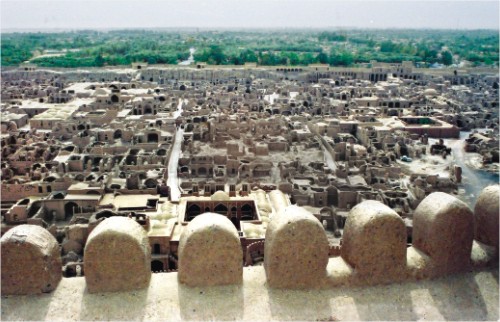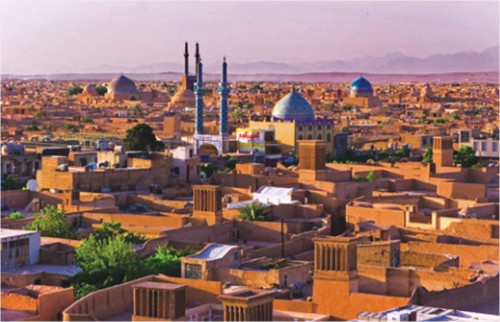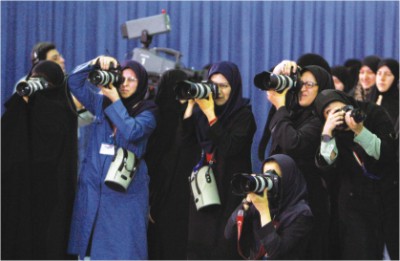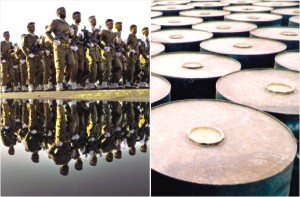
Inside
|
A country with a view Syed Rezaul Karim takes us on a journey to the Islamic Republic Flying from Bahrain, the busy hub of the Persian Gulf, the new Imam Khomeini International Airport at Tehran looks relatively quiet and unhurried. There is no bevy of aeroplanes touching down or taking off. The spanking modern architecture of the airport sparkles under the azure sky. Only when one approaches the city is one awakened to the tremendous rush of traffic, the brightly lit shops and arcades stuffed with wares, and the beautiful minarets of the mosques. Life throbs and flows in Tehran. The occasion was the celebration of the 800th birth anniversary of Maulana Jalaluddin Rumi, the Sufi poet who wrote in Persian and whose Mathnawi-e-Manavi was dubbed as "Koran in Pahlavi language" by another Persian mystic poet, Mollah Zami, in the thirteenth century.
There is a palpable perception, fed partly by ignorance and partly by propaganda outside Iran, that Shia Islam represented by the Islamic Republic does not tolerate Sufism. The measure of importance and significance attached to the celebration of Maulana Rumi's birth anniversary at the behest of the Iranian Ministry of Culture was borne out amply by the fact that the inaugural conference was presided over by the speaker of the Majlis, the parliament of Iran, and the Chief guest speaker was none other than the president of the Islamic Republic of Iran, Mahmoud Ahmedinajad. Researchers and scholars from around the world, including the US, UK, France and Germany participated in the conference, which was also attended by high functionaries of the Iranian government, academics, intellectuals, students and the elite. This is what President Ahmedinajad had to say on the occasion: "Maulana (Jalaluddin) is alive in the soul of human beings. There are two reasons for Maulana's enduring popularity. Maulana answers why a human being rises so high, and that is because of the affection and love to all human beings and freedom from the carnal soul. And secondly, Maulana remains fresh in our minds as no obsolescence will tire anyone as the message of love he advocates seeks to remove all pain and anguish from the world." President Ahmedinajad berated the "destructive counter culture" targeting and destroying other cultures. There was an interlude of flute reverie played by the famous Iranian flute player, Hasan-e-Nauhi, based on a theme from the Mathnawi of Jalaluddin Rumi. Does the above resemble remotely the so-called hostility of Shia Islam represented by the Islamic Republic of Iran to Sufi thought and practice, which professes love, purification of heart and the contemplation of the Creator? How can a nation which boasts of, and takes pride in, Hafiz, Sadi, Rumi, Jami, Khayyam, and Attar, to name a few, deny Sufism? And did not the whole conference on Rumi resound with the utterance of "darud" (peace) on the Prophet as soon as the name of the Prophet was uttered by any speaker? And did not the conference culminate in a dedication ceremony to the mendicant Shams-e-Tabriz, the spiritual master of Jalaluddin at Khoi in Tabriz, where the elusive fakir was born, and is claimed by Iranians to have been buried there? There is also an impression that gained currency on the heels of the Iranian Revolution that the clerics who rule Iran have pushed the nation to the domain of orthodoxy, and personal freedom and expression of thought are suppressed. On the eve of the conference, the guests were entertained with a drama in a theatre equivalent to our Shilpakala Academy. An episode from the Mathnawi, based on the allegory of love being transformed from carnal to mystical, was staged.
Seven women actresses together with several men performed superbly on the stage, accompanied by music rendered by another group of women. Of course, the women wore chador, but it did not in any way rob the show of its glitter. The museum of contemporary art in Tehran displays fine works of Iranian and Western artists. The prominent place is occupied by a sculpture by the American sculptor Alexander Kaldori. The works of four contemporary artists and four photographers, all from the US, are displayed. There is no prejudice, rather an appreciation for the art of the West, and it is being displayed prominently. The Iranian women were ubiquitous in their black head and body cover. But beneath the chador, almost every woman wears jeans. In Tehran, one can see young Iranian women stopping a taxi on the road and sharing the front or back seat with total strangers, and getting down at the destination and paying her fare. There is no hesitation or unusualness about this. The attitude towards women in workplaces, on the streets, or in the buses or taxis, is one of ease. The women exude confidence and freeness, albeit within the cover of the chador. Of university students in Iran 65% are women, and they are very modern in their attitude and free in their behaviour. In Tabriz, a girl student with a few friends accompanied visiting foreigners to the market place, and when asked whether she liked western music she put her mobile phone near the questioner's ear. It was a song from the latest albums coming out of the US. Funnily, she does not speak English well, but loves western music. Iranians do not hate the US or the West; but when it comes to President Bush and his administration it is, of course, different.
How does Iran face up to, and suffer from, the sanctions slapped by the United States in an attempt to thwart nuclear development of Iran -- a program which Iran maintains is peaceful and legitimate, and the USA suspects as subterfuge for making nuclear weapons. There is no visible effect of the sanctions on the life of the Iranians insofar as their daily life is concerned. However, in the international trade sector, the US banks, which used to be part of the monetary transactions are cut off as an aftermath of the sanctions and, therefore, the dollar volume in oil trade is declining. Iran is trading more and more in euro and yen. Non-American financial cial institutions, not having significant American exposure, are gradually taking over the oil trade. Iran has a huge foreign exchange reserve; the spiralling price of oil, selling at $90 a barrel, has given the Iranians extra revenue. Their budget price for a barrel of oil was fixed at $60. This huge surplus has enabled the Iranian regime to spend on social services like health and education, subsidising food and petrol and investing in physical infrastructure. The cheapest commodity is bread, and citizens have the opportunity to draw rations at subsidised prices. But the Bush administration is targeting the elite Qods force of the Iranian Revolutionary Guard Corps. US Secretary of State Condoleezza Rice told the House of Representatives Foreign Relations Committee: "We are determined to cut off Iran's malignant activities in Iraq," and that Washington was looking closely at "new designations" against Tehran.
But as one observer pointed out: "Iranians have a strong sense of themselves," and the regime is unlikely to back off under US pressure. An Iranian scholar working in the US said: "Ordinary American citizens do not know Iran or its culture; they go by the headlines in their newspapers which depict Iran as a country ruled by mullahs advocating fanaticism. They do not know that Iran has 4,000 years of history; Iranians have to be understood with reference to their culture. The Judeo-Christian culture in the US encourages unlimited freedom in the pursuit and accumulation of wealth. They do not have a just social system." The Iranians are worried about the consequences that will follow in the unlikely event of an American or Israeli attack on the nuclear facilities. It is unlikely that Iran will take that sort of action lying down, and whatever the standing of Mr. Ahmedinajad in the political polls, Iranians will rally round their president against such aggression. An Iranian diplomat in private said that Iran was a politically stable and economically solid country in the Middle East. It is straddling on a landmass bordering Afghanistan in the East and Iraq and Turkey in the West. It faces the Middle Eastern countries in the Gulf. Any attack on Iran will have disastrous consequences in the Middle East, and will further complicate the resolution of problems in Iraq and Afghanistan. As the chief cleric of Iran, Imam Khameini, said: "US cannot decide for Iran." Syed Rezaul Karim is a Forum contributor. |



 These "new designations" are Iran's Revolutionary Guards, who control the firms, which develop and operate oil projects in Iran. By freezing or reducing funds designated from investments in Iran substantially, it is believed that the economy will be hurt and there will be discontent within Iran.
These "new designations" are Iran's Revolutionary Guards, who control the firms, which develop and operate oil projects in Iran. By freezing or reducing funds designated from investments in Iran substantially, it is believed that the economy will be hurt and there will be discontent within Iran.